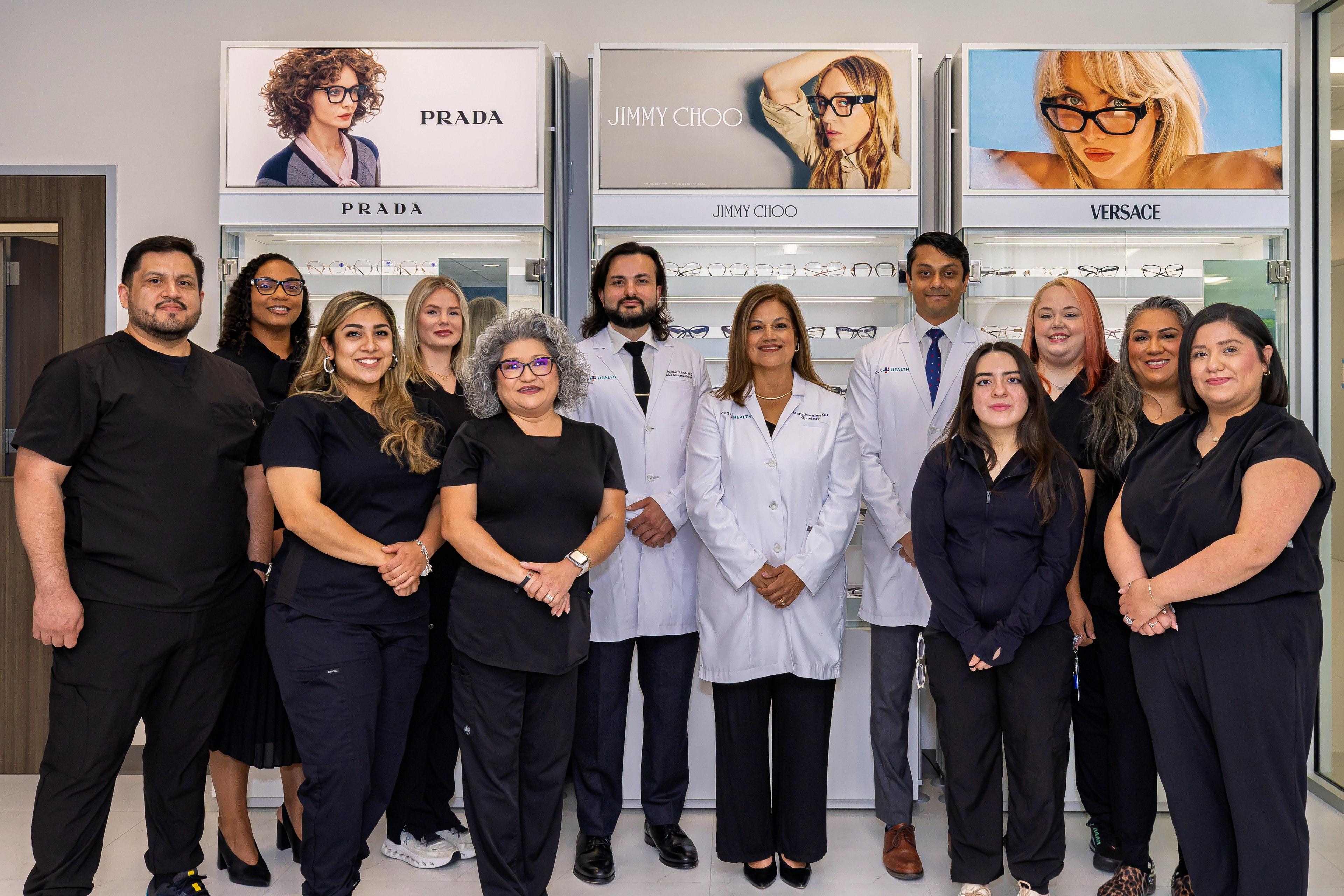Eye Care

Comprehensive Vision and Eye Care in Houston-Clear Lake
At the CLS Health Eye Center, our ophthalmologists and optometrists diagnose and treat everything from common vision issues to complex eye conditions. Whether you're struggling with blurry vision, managing an ongoing eye disease, or considering vision-enhancing procedures, our eye specialists deliver expert care combined with state-of-the-art technology to help you see the world with greater clarity, confidence, and comfort.
Book a FREE LASIK Consultation
Explore Eyewear Options

See which frames and lenses we carry to support your vision and lifestyle.

- Versace
- Jimmy Choo
- Prada
- Tory Burch
- Coach
- Costa
- Dolce & Gabbana
- Emporio Armani
- Giogio Armani
- Michael Khors
- Oakley
- Ray Ban
- Ray Ban Meta
- Swarovski
- Tiffany
- Nuance (with built-in sound enhancers)
- Varilux
- Eyezen
- Transitions
- Prevencia (with Blue Light Blocker).
Providers

Cornea and External Diseases, Ophthalmology

Uveitis, Ophthalmology

Optometry
What's the Difference Between an Optometrist and an Ophthalmologist?
- Ophthalmologists are medical doctors who provide comprehensive eye care, including diagnosing and treating complex eye diseases, performing surgeries like cataract removal or LASIK, and managing advanced eye conditions.
- Optometrists provide routine vision care, perform eye exams, prescribe corrective lenses, and manage some eye conditions. Optometrists, unlike ophthalmologists, do not perform surgery.
Conditions & Treatments
We provide complete eye care for all ages, including comprehensive eye exams, specialty contact lens fittings, and prescription eyeglasses. Regular checkups help detect early signs of eye disease and maintain long-term visual health.
Our specialists diagnose and treat a wide range of eye conditions such as dry eye syndrome, blepharitis, corneal infections, keratoconus, and uveitis. Using advanced imaging and targeted therapies, we relieve discomfort, preserve vision, and prevent future complications.
Our ophthalmologists offer advanced laser vision correction procedures including LASIK, PRK, and SMILE eye surgery. These treatments reshape the cornea to correct nearsightedness, farsightedness, and astigmatism. Each option is tailored to your eye health and lifestyle, helping reduce or eliminate the need for glasses or contact lenses.
For patients who may not be candidates for LASIK, options like EVO ICL and RLE (Refractive Lens Exchange) provide clear, lasting vision improvement. EVO ICL implants a small, flexible lens inside the eye, while RLE replaces the natural lens with an artificial one, like cataract surgery. Both procedures deliver precise, long-term correction with excellent visual quality.
Our cataract specialists restore clear vision by removing the cloudy natural lens and replacing it with a custom intraocular lens (IOL). We offer advanced options such as Light Adjustable Lenses (LAL and LAL+), multifocal, trifocal, EDOF, and Toric lenses for personalized results. These innovations help patients achieve sharper focus, reduced glare, and greater independence from glasses.
We manage glaucoma through customized treatment plans that may include medicated eye drops, laser trabeculoplasty, or microinvasive glaucoma surgery (MIGS). Advanced options like SLT and trabeculectomy help lower eye pressure and protect the optic nerve to prevent vision loss.
Our retina specialists diagnose and treat conditions such as macular degeneration, retinal tears, and diabetic eye disease. Through early detection and advanced treatments, including laser therapy and injections, we help preserve central vision and prevent further retinal damage.
We provide expert evaluation and treatment for eyelid tumors, basal cell carcinoma (BCC), and ocular surface squamous neoplasia (OSSN). Our multidisciplinary approach combines medical and surgical care to remove abnormal growths while protecting vision and eye structure.
Schedule Your Eye Appointment Today
You don’t have to struggle with eye issues. Whether you're seeking relief from eye pain or discomfort, managing a chronic eye condition, or exploring surgical options for improved vision, our experienced ophthalmologists provide individualized care tailored to your needs.
Don't see your insurance listed? We may still accept it!
CLS Health updates accepted insurance plans regularly. Please call (281) 724-1860 to verify your coverage.
- Vision PPO
- PPO Advantage
- PPO Choice
- PPO New Every 2
- PPO Select
- PPO Signature
- Vision PPO Plan
- HMO Advantage
- Easy Options Eyewear Only 120
- Standard
- NSP Choice Plus Plan
FAQs
The cost of LASIK surgery can vary based on factors like your location, a surgeon’s expertise, the specific technology used, and whether the price includes pre- and post-operative care. It’s best to schedule a consultation with your provider for a personalized estimate.
Cataract surgery typically takes 10 to 20 minutes to perform, depending on the complexity of the case and the surgeon’s technique. However, you should plan to spend about 2 to 3 hours at the surgical center to allow time for pre-operative preparation, anesthesia, and post-operative monitoring. During the procedure, the cloudy lens is removed and replaced with a clear artificial intraocular lens (IOL), restoring vision. Cataract surgery is usually performed on an outpatient basis, so you can go home the same day.
The out-of-pocket cost for a comprehensive eye exam at CLS Health is $189 for new patients without insurance. If you have health insurance and/or vision insurance, your out-of-pocket cost may be $0 depending on your specific plan coverage. For precise costs and insurance eligibility, consult your CLS Health eye care provider.
A diabetic eye exam is a specialized eye examination designed to detect and monitor vision problems caused by diabetes, such as diabetic retinopathy, macular edema, glaucoma, and cataracts. These conditions can lead to vision loss if not diagnosed and treated early.
During the exam, your eye care provider may perform:
- Dilated Eye Exam: To examine the retina and optic nerve for signs of damage.
- Ocular Imaging: Such as optical coherence tomography (OCT) to assess retinal thickness and detect fluid buildup.
- Fluorescein Angiography: To evaluate blood flow in the retina.
- Eye Pressure Measurement: To check for glaucoma.
Diabetic eye exams are recommended annually for individuals with diabetes, even if vision problems aren’t noticeable. Early detection is key to preventing vision loss. Schedule your diabetic eye exam today to safeguard your vision.
Progressive lenses are multifocal eyeglass lenses designed to correct vision at multiple distances—near, intermediate, and far—without the visible lines found in traditional bifocals or trifocals. These lenses provide a seamless transition between different vision zones, allowing you to see clearly whether you're reading up close, working on a computer, or viewing objects at a distance. They are commonly recommended for individuals with presbyopia, a natural age-related condition that makes focusing on close objects more difficult. Progressive lenses offer a more natural visual experience and are aesthetically pleasing since they resemble regular single-vision lenses.
The best eye drops for dry eyes depend on the severity and underlying cause of your symptoms. Over-the-counter options include:
- Artificial Tears: For mild to moderate dryness. Look for preservative-free formulas for frequent use.
- Lubricating Gel Drops or Ointments: For long-lasting relief, especially overnight.
For more severe or chronic dry eyes, your doctor may recommend:
- Prescription Eye Drops: To reduce inflammation and increase tear production.
- Steroid Eye Drops: For short-term use to address significant inflammation.
Always consult your CLS Health eye care provider to determine the most effective treatment for your specific needs. Overuse or misuse of eye drops can sometimes worsen symptoms, so professional guidance is key.
Glaucoma cannot currently be cured, but it can be effectively managed to prevent or slow down vision loss. This chronic eye condition causes damage to the optic nerve, often due to elevated intraocular pressure (IOP). Early detection and treatment are crucial to preserving vision.
Common treatments include:
- Prescription Eye Drops: To reduce eye pressure.
- Laser Therapy: To improve fluid drainage in the eye.
- Surgery: For more advanced cases to control eye pressure.
While existing damage from glaucoma is irreversible, ongoing treatment and regular monitoring by an ophthalmologist can help maintain vision and prevent further progression.
